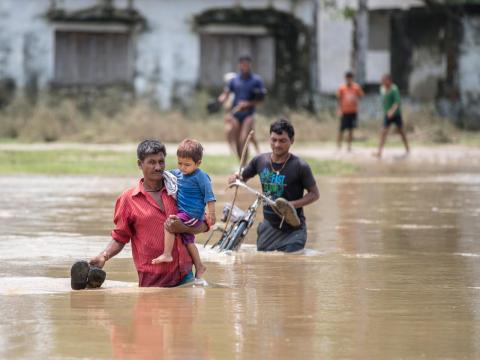The climate crisis is here, and we must act now to protect children and young people from its impact

New report highlights how climate crises is affecting children’s learning and protection
Kathmandu, 8 October – The climate crisis is already infringing on the human rights of children and young people in Nepal, according to a new research released today by the Child-centred Disaster Risk Reduction and Climate Change (CDCC) Consortium.
The research “Impacts of Climate Crisis and Environmental Degradation on Children and Youth in Nepal” explores how climate crises and environmental degradation affect children and young people's lives in ways that would prevent them from learning and being protected.
The report highlights that climate crisis has affected children and young people’s right to survive and growth. Half of those killed or injured by climate hazards in the last 5 years were children and youths. Among those who receive less food after a climate-induced disaster, nearly two-thirds are children, and a quarter of them are youths. These impediments lead to stunted growth and prevents children from reaching their full potential, says the report.
Lack of appropriate climate change and environmental policies, practices, knowledge, capacity, technologies, and other resources to adapt and respond at the local and household levels, particularly for children and youth is one of the reasons why children and young people are more vulnerable to climate crisis, the research highlights.
There are no local government policies related to child and youth development or to support children and youth in climate change adaptation. This lack of engagement on climate change issues results in low levels of knowledge and awareness among children and youth, especially around possible measures for adaptation.
The report also highlights that girls and young women suffer the impacts of climate crises most acutely. They are first to receive shifted responsibilities for household labour, reduced portions of food, water or money when resources are scarce and consequently lose out on education and leisure activities. They are also likely to be married off when families face financial hardship.
“In our report, children and young people are telling us that the climate crisis is impacting their lives in extremes. We must listen to children and turn this around before its too late. We must take immediate actions to address the problems and needs of children stemming from climate change,” says Bishnu Prasad Kharel, the coordinator of CDCC consortium, consisting of Plan International Nepal, Save the Children, UNICEF and World Vision International.
The report recommends developing and implementing child and youth-centered climate friendly policies and plans at local levels, allocating adequate financial resources to child- and youth-centered climate change adaptation, ensuring meaningful participation of young people in decision making and adopting environment sustainability practices that aim to reduce the impact of climate change like promoting safer and green school concepts, climate-adaptive water and sanitation systems, and resilient livelihoods.
The Consortium calls for concrete policies and plans on reducing the impacts of climate crisis on household level, especially on children and young people, and to make this planet a safe place for the children.
ENDS
Note to the Editor
The report “Impacts of Climate Crisis and Environmental Degradation on Children and Youth in Nepal” was prepared by Child-centred Disaster Risk Reduction and Climate Change (CDCC) Consortium. The consortium which was established in 2016, consists of Plan International Nepal, Save the Children, UNICEF and World Vision International. CDCC Consortium works to secure children participation in disaster risk reduction (DRR) and climate resilience initiatives at every level, enabling them to be key change makers for building a more climate resilient and sustainable society.
For more information contact:
Bishnu Prasad Kharel
Coordinator, CDCC Consortium
bishnu.kharel@savethechildren.org
9851048638
